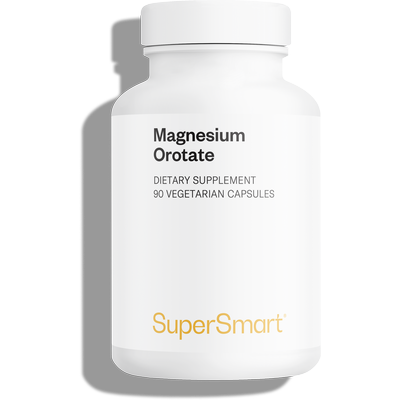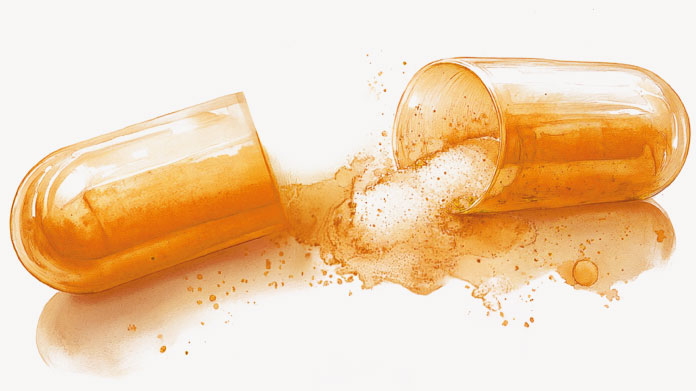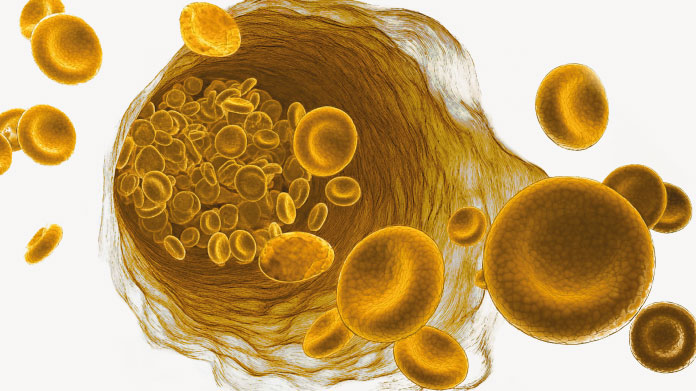Which is the best magnesium supplement?
Magnesium is an excellent anti-fatigue mineral, also good for the muscles, bones and mood. But which form of magnesium should you choose (orotate, oxide, citrate …) for maximum efficacy?

Recap: what is magnesium’s role in the body?
Magnesium is a mineral essential for good health. Over 50% of the body’s magnesium is concentrated in the bones and teeth, with 25% in muscles and a tiny amount in the extracellular milieu (1%).
Involved in more than 300 metabolic reactions, this key substance ensures a number of vital functions, helping, in particular:
- to reduce fatigue;
- to support normal nervous system and psychological function (1);
- to support normal muscle function (2);
- to maintain healthy teeth and bones (3);
- and to support normal protein synthesis.
As the body is unable to produce magnesium, we need to obtain sufficient amounts from the diet. In 2014, the EFSA (European Food Safety Agency) set an Adequate Intake for magnesium of 350 mg/day for men and 300 mg/day for women.
Sources of magnesium and deficiency
Among the best sources of this mineral are cocoa, nuts and dried fruits, wholegrains, molluscs and crustaceans, and highly mineralised waters.
However, magnesium deficiency remains widespread; it’s the most common deficiency in Europe after vitamin D (4). Besides a diet low in magnesium-containing foods, other factors such as stress, intensive exercise, intestinal complaints or taking certain medicines can all contribute to malabsorption or excessive renal excretion of this mineral (5).
Difficult to detect, a lack of magnesium initially presents as nausea or vomiting, persistent fatigue , loss of appetite or cramps. Over time, it can lead to numbness or an irregular heartbeat (6). Many people therefore choose to supplement with magnesium to optimise their daily intake and prevent deficiency.
Magnesium supplements: important differences
Magnesium supplements are based on a combination of magnesium salt and a natural mineral or organic vehicle which facilitates its entry into cells. So there are:
- inorganic soluble salts: magnesium chloride, magnesium sulphate ...;
- inorganic insoluble salts: magnesium oxide, carbonate, hydroxide;
- organic soluble salts: magnesium citrate, lactate, malate … ;
- organic soluble complexes: magnesium glycinate, bisglycinate.
However, these magnesium supplements are not all the same. Some have a lower dose of elemental magnesium, while others are poorly absorbed by the body as they have low bioavailability (7). In the latter case, inadequate solubility in the gut is often the reason.
In addition, some magnesium salts retain water in the colon, potentially causing a laxative effect.
In short, there are genuine differences in terms of uptake, efficacy and tolerance.
Magnesium orotate: the best magnesium supplement of all
Among all the forms on the market, magnesium orotate is the one to choose because of its content of orotic acid. Long known as vitamin B13, this organic compound is secreted by gut flora and binds to alkaline minerals (zinc, potassium, calcium, and magnesium), ensuring they are transported effectively to priority sites in the body (8).
Taking magnesium in its orotate form closely reproduces the natural uptake of minerals provided by the diet.
Magnesium orotate supplements therefore offer maximum bioavailability (which is the case, for example, with the exceptional supplement Magnesium Orotate).
Are there other forms of magnesium to seek out?
The classic magnesium malate form remains a satisfactory alternative to orotate (9). Here, the magnesium salt is combined with malic acid, a substance present in many types of fruit, such as apples, pears and grapes.
In addition to having good bioavailability, magnesium malate acts as a chelator: in releasing the magnesium salt, malic acid captures molecules of aluminium, a heavy metal that tends to accumulate in the body (10). Its excellent solubility means it is very well tolerated by the digestive system. Another point in its favour is its affordable price (an example is the supplement Magnesium Malate).
If you’d rather not choose between them, opt instead for a supplement that combines several forms of magnesium (such as OptiMag, which offers 8 forms carefully selected for their excellent bioavailability and excluding the least absorbable forms such as magnesium oxide, carbonate and hydroxide). It’s a little more expensive than malate, but offers a more synergistic effect.
Adapt your magnesium supplementation to your individual needs
Do you want to take a magnesium supplement for a specific reason? If so, consider a cutting edge combination supplement which will target magnesium’s effects:
- for stress: take magnesium alongside adaptogen plants (the supplement Adrenal Support Formula combines magnesium with maca and tulsi, which support good mental health) (11-12);
- for bone health: combine it with calcium which is necessary for healthy bones, as well as zinc, vitamin D or vitamin K which also support bone health (you’ll find them all in the exceptional formulation Super Bone Formula) (13-15);
- a real discovery in the area of cognitive health, magnesium threonate (the compound in the innovative product Magnesium Threonate) is the only form able to cross the blood-brain barrier to reach the brain, and is therefore now acclaimed by many experts in brain health (16).
References
- Pickering G, Mazur A, Trousselard M, et al. Magnesium Status and Stress: The Vicious Circle Concept Revisited. 2020;12(12):3672. Published 2020 Nov 28. doi:10.3390/nu12123672
- Reno AM, Green M, Killen LG, OʼNeal EK, Pritchett K, Hanson Z. Effects of Magnesium Supplementation on Muscle Soreness and Performance. J Strength Cond Res. 2020 Oct 1. doi: 10.1519/JSC.0000000000003827. Epub ahead of print. PMID: 33009349.
- Orchard TS, Larson JC, Alghothani N, et al. Magnesium intake, bone mineral density, and fractures: results from the Women's Health Initiative Observational Study. Am J Clin Nutr. 2014;99(4):926-933. doi:10.3945/ajcn.113.067488
- Mensink GB, Fletcher R, Gurinovic M, Huybrechts I, Lafay L, Serra-Majem L, Szponar L, Tetens I, Verkaik-Kloosterman J, Baka A, Stephen AM. Mapping low intake of micronutrients across Europe. Br J Nutr. 2013 Aug;110(4):755-73. doi: 10.1017/S000711451200565X. Epub 2013 Jan 14. PMID: 23312136; PMCID: PMC3785176.
- Vormann J. Magnesium: Nutrition and Homoeostasis. AIMS Public Health. 2016;3(2):329-340. Published 2016 May 23. doi:10.3934/publichealth.2016.2.329
- DiNicolantonio JJ, O'Keefe JH, Wilson W. Subclinical magnesium deficiency: a principal driver of cardiovascular disease and a public health crisis [published correction appears in Open Heart. 2018 Apr 5;5(1):e000668corr1]. Open Heart. 2018;5(1):e000668. Published 2018 Jan 13. doi:10.1136/openhrt-2017-000668
- Blancquaert L, Vervaet C, Derave W. Predicting and Testing Bioavailability of Magnesium Supplements. 2019;11(7):1663. Published 2019 Jul 20. doi:10.3390/nu11071663
- Classen HG. Magnesium orotate--experimental and clinical evidence. Rom J Intern Med. 2004;42(3):491-501. PMID: 16366126.
- Uysal N, Kizildag S, Yuce Z, Guvendi G, Kandis S, Koc B, Karakilic A, Camsari UM, Ates M. Timeline (Bioavailability) of Magnesium Compounds in Hours: Which Magnesium Compound Works Best? Biol Trace Elem Res. 2019 Jan;187(1):128-136. doi: 10.1007/s12011-018-1351-9. Epub 2018 Apr 21. PMID: 29679349.
- Yao H, Zhang S, Zhou W, Liu Y, Liu Y, Wu Y. The effects of exogenous malic acid in relieving aluminum toxicity in Pinus massoniana. Int J Phytoremediation. 2020;22(6):669-678. doi: 10.1080/15226514.2019.1707162. Epub 2020 Mar 5. PMID: 32138521.
- Jamshidi N, Cohen MM. The Clinical Efficacy and Safety of Tulsi in Humans: A Systematic Review of the Literature. Evid Based Complement Alternat Med. 2017;2017:9217567. doi:10.1155/2017/9217567
- Zhu H , Xu W , Wang N , Jiang W , Cheng Y , Guo Y , Yao W , Hu B , Du P , Qian H . Anti-fatigue effect of Lepidium meyenii Walp. (Maca) on preventing mitochondria-mediated muscle damage and oxidative stress in vivo and vitro. Food Funct. 2021 Apr 7;12(7):3132-3141. doi: 10.1039/d1fo00383f. Epub 2021 Mar 17. PMID: 33729250.
- Laird E, Ward M, McSorley E, Strain JJ, Wallace J. Vitamin D and bone health: potential mechanisms. 2010;2(7):693-724. doi:10.3390/nu2070693
- O'Connor JP, Kanjilal D, Teitelbaum M, Lin SS, Cottrell JA. Zinc as a Therapeutic Agent in Bone Regeneration. Materials (Basel). 2020;13(10):2211. Published 2020 May 12. doi:10.3390/ma13102211
- Weber P. Vitamin K and bone health. 2001 Oct;17(10):880-7. doi: 10.1016/s0899-9007(01)00709-2. Erratum in: Nutrition 2001 Nov-Dec;17(11-12):1024. PMID: 11684396.
- Shen Y, Dai L, Tian H, et al. Treatment Of Magnesium-L-Threonate Elevates The Magnesium Level In The Cerebrospinal Fluid And Attenuates Motor Deficits And Dopamine Neuron Loss In A Mouse Model Of Parkinson's disease. Neuropsychiatr Dis Treat. 2019;15:3143-3153. Published 2019 Nov 11. doi:10.2147/NDT.S230688
Keywords




